|
|
|
Sort Order |
|
|
|
Items / Page
|
|
|
|
|
|
|
| Srl | Item |
| 1 |
ID:
074409
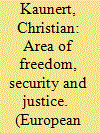

|
|
|
|
|
| Publication |
2005.
|
| Summary/Abstract |
Despite the significant growth the Area of Freedom, Justice and Security (AFSJ) has seen recently, it is still comparatively under-researched. The main argument of the article is that norms have been constructed over recent years in such a way that the AFSJ has set a project in motion which aims to create a veritable 'European Public Order'. This change has not come overnight though, and it has been normatively constructed over the past decade. In agreement with Christiansen, it is argued that a constructivist institutionalist approach may be best suited to analyse these developments, representing one of the new 'high points' of European construction. Four different stages of development are examined, i.e. the pre- and post-Maastricht, the Amsterdam and Tampere, and the Constitutional Treaty phases. These developments have now significantly altered the norm of national sovereignty in EU internal security. As a consequence of this, some of the most spectacular changes in the EU can be expected in this area in the future with the new five-year ASFJ programme agreed in The Hague.
|
|
|
|
|
|
|
|
|
|
|
|
|
|
|
|
| 2 |
ID:
094014
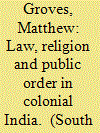

|
|
|
|
|
| Publication |
2010.
|
| Summary/Abstract |
Throughout history expanding imperial powers have consistently cast themselves as reluctant but dutiful policemen-bringers of peace and order to the periphery. The British were no exception. In India, however, the vaunted Pax Britannica was limited and patchy. While not exactly a myth, it never quite matched either the roseate claims made of it in official propaganda or the jingoistic perceptions of the masses at home.
|
|
|
|
|
|
|
|
|
|
|
|
|
|
|
|
| 3 |
ID:
185079
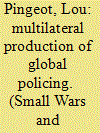

|
|
|
|
|
| Summary/Abstract |
This article argues that UN peace operations play a central role in the nexus between policing and counterinsurgency, and constitute one of the underappreciated sites and circuits of counterinsurgent knowledge. It posits that the convergence between peace operations and counterinsurgency has been driven not only (or even primarily) by these mission’s more assertive military posture under ‘stabilization’, but also by the turn to ‘polickeeping’, the growing role of police forces and increasing importance of policing tasks in peacekeeping. The stabilization/policekeeping mindset rests on the assumption of a continuum from minor instances of disorders to full-blown armed conflict, leading to an expansive understanding of what may constitute a threat to stability and require international intervention. The articles teases out the macro and micro manifestations of this mindset through the lens of UN peace operations’ response to civil unrest and demonstrations. It shows that, because peace operations are a point of cross-fertilization for the creation and transmission of global policing practices, UN protest policing reverberates beyond the specific countries in which peace operations are deployed. Peace operations create a global demand for and supply of specific skills and tools, in particular paramilitary police forces.
|
|
|
|
|
|
|
|
|
|
|
|
|
|
|
|
| 4 |
ID:
185080
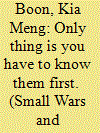

|
|
|
|
|
| Summary/Abstract |
This article critically examines the models of protest policing deployed by the Malaysian police during the BERSIH 2.0 wave of protests (2011–2016). Based on participant observation and critical ethnography of these protest events, it explains how the state and police adapted to the surge of street protests in Kuala Lumpur by bringing together various elements of policing practices in its attempt to contain dissent on the streets. I argue that the new ‘Peaceful Assembly assemblage’ of policing practices, though distinct and significantly different in its overall governing logic compared to its predecessor, it remains heavily connected to late colonial forms of public order and counterinsurgent policing, especially the Special Branch and the Federal Reserve Unit (riot police). In this sense, the article shows that colonial policing’s afterlife is a major factor for understanding how Malaysia’s protest policing experience complicates and departs from patterns of protest policing development observed in the Global North.
|
|
|
|
|
|
|
|
|
|
|
|
|
|
|
|
| 5 |
ID:
131817
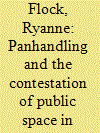

|
|
|
|
|
| Publication |
2014.
|
| Summary/Abstract |
Urban public space is a product of contestations by various actors. This paper focuses on the conflict between local level government and beggars to address the questions: How and why do government actors refuse or allow beggars access to public space? How and why do beggars appropriate public space to receive alms and adapt their strategies? How does this contestation contribute to the trends of urban public space in today's China? Taking the Southern metropolis of Guangzhou as a case study, I argue that beggars contest expulsion from public space through begging performances. Rising barriers of public space require higher investment in these performances, taking even more resources from the panhandling poor. The trends of public order are not unidirectional, however. Beggars navigate between several contextual borders composed by China's religious renaissance; the discourse on deserving, undeserving, and dangerous beggars; and the moral legitimacy of the government versus the imagination of a successful, "modern," and "civilised" city. This conflict shows the everyday production of "spaces of representation" by government actors on the micro level where economic incentives merge with aspirations for political prestige.
|
|
|
|
|
|
|
|
|
|
|
|
|
|
|
|
| 6 |
ID:
184785
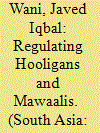

|
|
|
|
|
| Summary/Abstract |
In 1938, a communal conflict took place in the city of Bombay. This confrontation between Hindus and Muslims flared into large-scale violence. During the riots, the home minister of the provincial government invoked a combination of laws such as Section 144 of the Code of Criminal Procedure and instituted curfews to control the situation. As a result, hundreds of inhabitants of the city were arrested. The purpose of this article is threefold. Firstly, it will highlight how communal conflict in the late colonial period would often begin over trivial issues but could easily expand into large-scale riots influenced by metapolitical concerns. Secondly, moments of ‘disorder’ facilitated the administrative urge to institute extraordinary laws like Section 144 and curfews. And thirdly, the invocation of extraordinary laws was justified in reference to various problem categories like mawaalis and hooligans in this case. Overall, the article will show that the provincial government led by Indians continued the colonial art of governance by resorting to repression as a significant tool to deal with political unrest.
|
|
|
|
|
|
|
|
|
|
|
|
|
|
|
|
| 7 |
ID:
130401
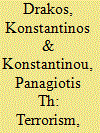

|
|
|
|
|
| Publication |
2014.
|
| Summary/Abstract |
Within a panel VAR framework and utilizing generalized impulse response and forecast error variance decomposition analysis, we explore the dynamic effects of terrorism and crime on public order and safety spending across European countries during the period 1994-2006. Our findings show that a 'shock' in terrorism and/or in crime, significantly increases the subsequent trajectory of public order and safety spending. As a by-product, we find that public spending is ineffective in reducing observed crime or terrorism.
|
|
|
|
|
|
|
|
|
|
|
|
|
|
|
|
|
|
|
|
|